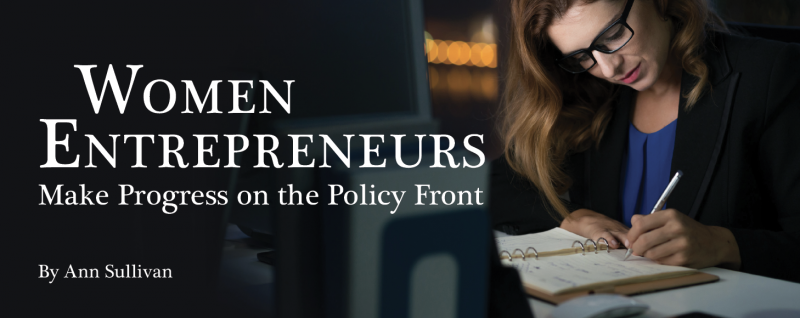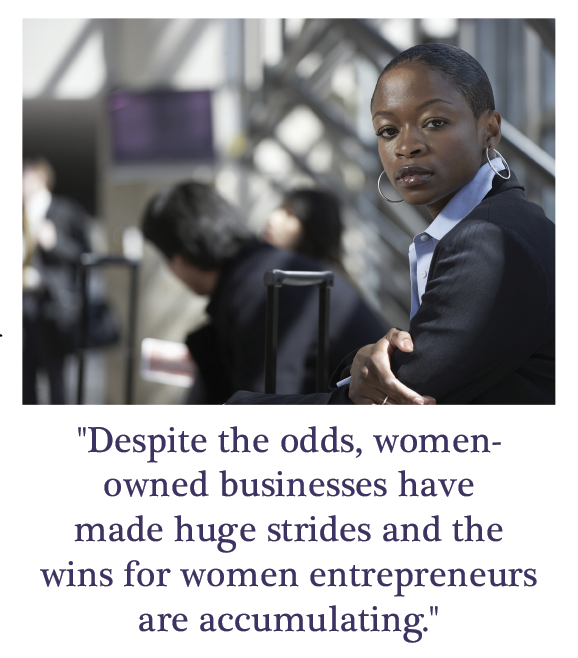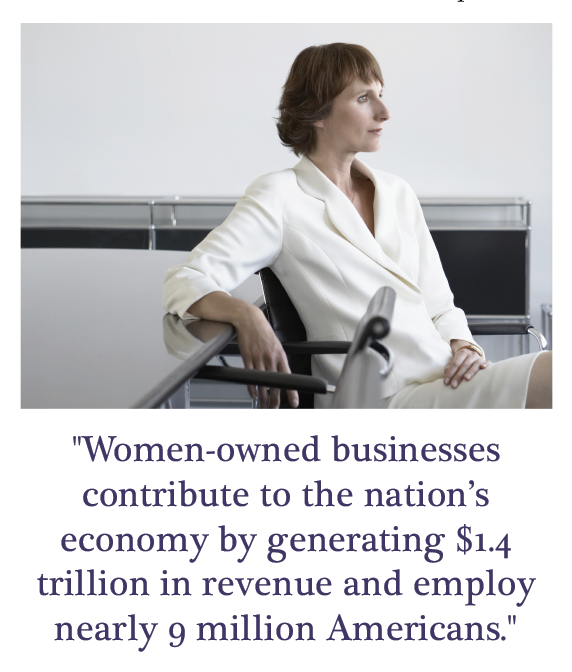
When I first began advocating for women entrepreneurs over 15 years ago, I was excited to take on the challenge. At that point the majority of meetings I went to on Capitol Hill consisted mostly of men, and no one was focusing on women business owners. For the first five years, I spent most of my time convincing the Congress that women business owners cared about economic issues that affected the growth of their business instead of the social issues “women” cared about. Not only was there a lack of understanding about women entrepreneurs, there was also a disparity between male-owned and women-owned businesses. The women’s business community’s favorite phrase was “we want a seat at the table.”
Looking back on the progress that women business owners have made over the last decade and a half, I am reminded that there was never one simple solution – no silver bullet to solve the inequities between male- and female-owned businesses and the disparities between large and small firms. Rather, we chipped away at access to markets and access to capital and urged elected officials and federal policymakers to consider women business owners in their deliberations. I am happy to report that today we have a seat at the table.
Despite the odds, women-owned businesses have made huge strides and the wins for women entrepreneurs are accumulating. In particular, we received great news last year when the Census Bureau’s Survey of Business Owners (SBO) reported that there are now nearly 10 million women-owned businesses in the U.S. From 2007-2012, the gap between SBO releases, the number of women-owned businesses increased by over 27 percent. Since 2002, the number of women-owned firms has increased by over 50 percent from 6.5 million.

What is even more impressive is the economic force that women-owned businesses have become. They contribute to the nation’s economy by generating $1.4 trillion in revenue and employ nearly 9 million Americans. These statistics reinforce the now-accepted conclusion that the women’s business community is a pillar of the American economy.
Looking toward future advocacy efforts, the key issues of women business owners generally fall into three buckets: access to federal contracts, access to entrepreneurial resources and access to capital.
Procurement Parity Takes Two Giant Leaps
The Women-Owned Small Business (WOSB) Federal Contract Program has continued to grow and women-owned firms are reaping the benefits. First, the SBA announced that in FY2015—the first time since 1994—the federal government has achieved its 5 percent goal of contracting to WOSBs. Why 1994? Because it is when the government established a 5 percent goal for contracting awards to women. And what an effort it took; members of Congress, national women’s business organizations including NAWRB, a supportive White House and SBA and thousands of women across the country who cared enough to keep up the pressure.
In the same week that they confirmed the government had finally reached its 5 percent contracting goal, the SBA also announced a significant expansion of the WOSB program. When the last disparity study was completed in 2007, women-owned firms were considered underrepresented in 83 industries, thus making those industries eligible for participation in the WOSB Program. WIPP advocated for a new study to update eligible NAICS codes for the program. The study, completed by the Department of Commerce earlier this year, found that women-owned businesses are underrepresented in 113 industries and now these industries are immediately eligible for the program—opening the doors for more than a third of all industries.
The disparity study, The Utilization of Women-Owned Businesses in Federal Prime Contracting, highlighted two very alarming facts. First, women are 21 percent less likely to get a government contract when controlling for factors such as age and size of the business. Second, the industries in which WOSBs are less likely to win contracts account for about 85 percent of both total contracts and dollars awarded. When taken together these facts show that the need for the WOSB Program still exists. We have made tremendous progress but our work is not done.

I have written previously about sole source authority—the ability for the agencies to award contracts directly to women-owned businesses. That authority was finalized in the Federal Acquisition Regulation (FAR)—the contractor’s rulebook—in January 2016. Now WOSBs can compete on a level playing field with all other small business set-aside programs and evidence shows that women are aggressively using this new tool.
Part of improving access to federal markets for women entrepreneurs, is improving access for the small business community as a whole. Moving in unison allows all small businesses to benefit. As the saying goes, a rising tide lifts all boats. That’s why I was particularly excited to see the House Small Business Committee’s first major piece of legislation for 2016 address many contracting issues. The Defending America’s Small Contractors Act of 2016 (H.R. 4341) will prove to be significant to small contractors. Moreover, the bill was approved unanimously by the Committee and with over two-thirds of the Committee contributing content to the bill.
Training and Counseling for Women Entrepreneurs
Women’s Business Centers, a network of over 100 non-profit organizations nationwide, are dedicated to assisting women entrepreneurs (or those that are interested in starting a business) and fill a much-needed role with respect to business generation and growth. Yet, for too many years, this program limped along with no increase in funding or change in program guidelines. Our question to Congress has been, “How can 100 women’s business centers serve 10 million women?”
In response to that question, the Senate acted and we are hopeful that the House will as well. For the first time in nearly a decade, Congress is on its way to reauthorizing the Women’s Business Center (WBC) Program. In the Senate, the Committee on Small Business and Entrepreneurship unanimously approved the Women’s Small Business Ownership Act of 2015, which would do just that. Senator Maria Cantwell (D-WA), Chair David Vitter (R-LA) and Ranking Member Jeanne Shaheen (D-NH) sponsored this landmark legislation and the bill was referred out of Committee on a bipartisan, unanimous vote—a rare occurrence in Congress. Representative Susan Delbene (D-WA) has introduced a companion bill in the House.
Under the bill, the WBC Program would be authorized at $21.75 million per year through FY2020, allowing more Centers and providing additional support to existing, successful Centers. SBA’s funding for WBCs are matched by private donations, doubling the impact of this increase. WBCs will be able to receive grants up to $250,000, a major increase from the previous maximum of $150,000.
Given that WBCs provide an invaluable resource for women entrepreneurs it is only reasonable that support is given to encourage job creation and job growth. Last year, they served over 140,000 women entrepreneurs, which led to the creation of over 760 new businesses.
Access to Capital
For as many strides as we made in access to federal markets and resources, access to capital lags far behind. A recent report by the Senate Committee on Small Business and Entrepreneurship highlighted many areas where women-owned businesses were underserved by private capital markets. The report pointed out that women-owned businesses receive only 4 percent of the total dollar value of small business loans and only 7 percent of all venture capital funds.
The report was illuminating and led to a renewed focus on reducing the gap between male and female led companies with respect to available capital. It was through this next new challenge for WIPP that we created WIPP’s Access to Capital platform titled “Breaking the Bank” and I am happy to report that we are already checking items off of our list. The Securities and Exchange Commission (SEC) finalized rules for equity crowdfunding, which allows small businesses to obtain capital from investors without going through the expensive and complex securities registration process. Additionally, the House passed legislation to give small businesses a voice at the SEC. The SEC Small Business Advocate Act of 2015 (H.R. 3784) passed the House in February and requires the SEC to establish an Office of the Advocate for Small Business Capital Formation to assist small businesses in accessing capital. Simplifying the patent and trademark process is another priority that the Senate Committee on Small Business and Entrepreneurship highlighted in a recent hearing. Making patents and trademarks more accessible will increase investment and allow women entrepreneurs to capitalize on their intellectual property.
While none of these policy changes will solve the access to capital struggle that women entrepreneurs currently encounter, WIPP and others are taking the same approach that we did to access to federal markets—chipping away at the issues.
Our Voice During the 2016 Elections
WIPP has launched WE Decide 2016, a collaboration with Personal BlackBox (PBB). WE Decide 2016 is an interactive, online platform for women entrepreneurs to have their voices heard during the 2016 elections. With the support and collaborative efforts of several associations with quick polls and issue surveys, we will be able to ascertain women business owners’ views. WE Decide 2016 engages women business owners and women entrepreneurs to focus our message on results, sensible regulations and an investment in small businesses. The opinions shared through WE Decide 2016 will culminate in a policy platform, which will be shared with Presidential and Congressional candidates at both national conventions.
When reflecting on these recent legislative and regulatory achievements, I am grateful for the progress that women entrepreneurs have made in so many different areas. None of this would have happened without advocacy. Advocacy is not a once-in-a-while exercise. Change does not happen with an annual visit to an elected official or a retweet by one person or one organization . It needs a constant drumbeat and direct focus by many. As we unite to tackle tough issues, I am absolutely convinced that 10 million women-owned businesses will make a difference.

Ann Sullivan is the President of Madison Services Group, Inc. (MSGI), a woman-owned company that provides government relations and business development services to corporate and non-profit clients.

 Login
Login
